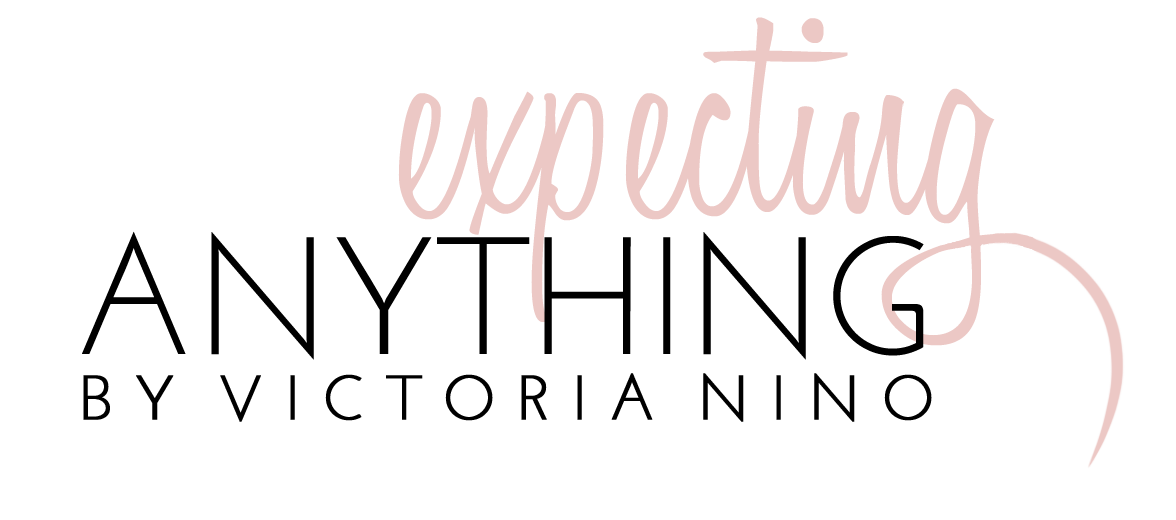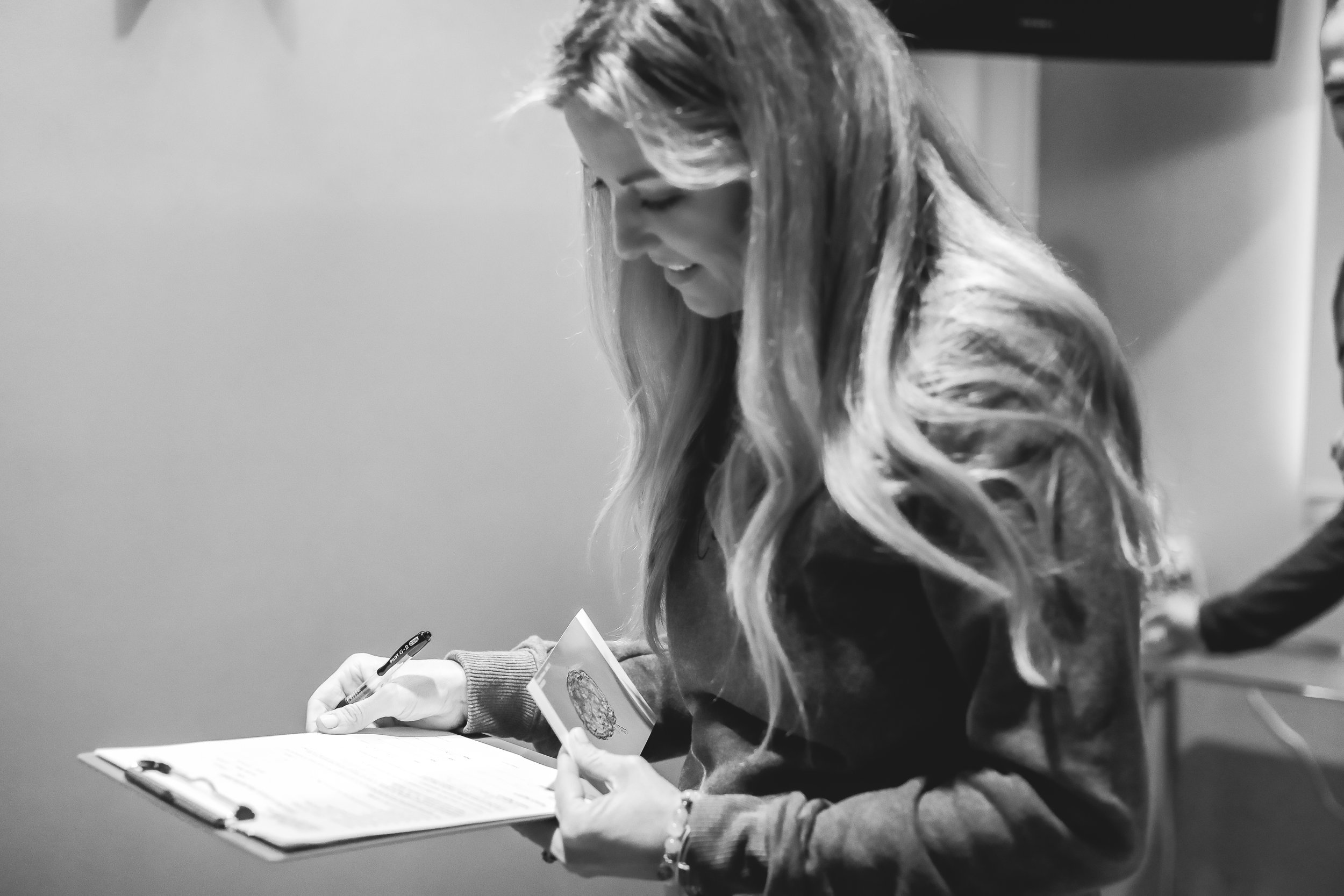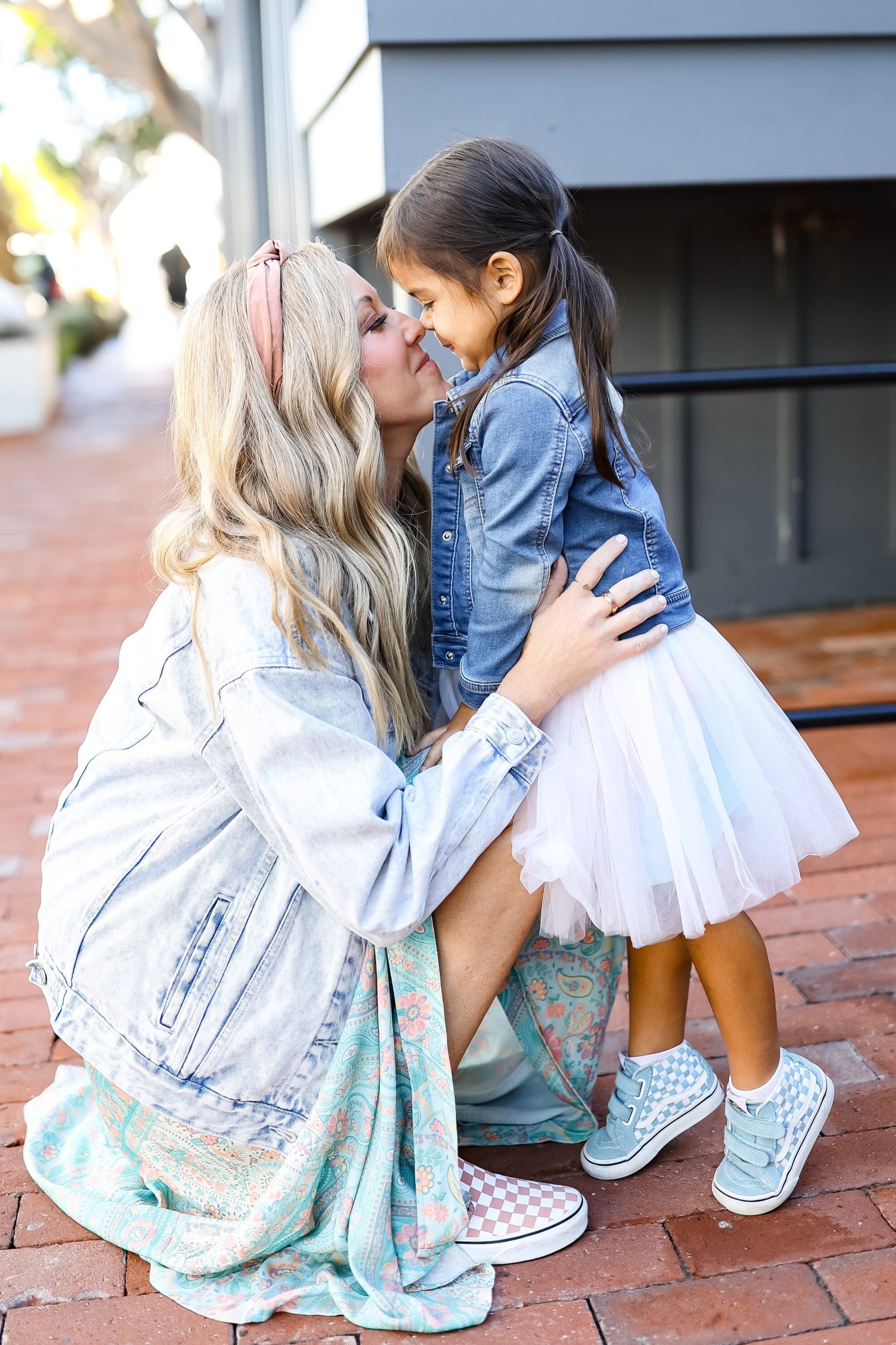This post is in partnership with Donor Nexus, Leading International Egg Donation Agency in California, to help educate and create awareness of the real emotions surrounding donor egg conception.
That the terminology would be so confusing on how to refer to our donor.
In the very beginning, when Flo was a newborn, I referred to our donor as “Egg Angel”, and then I realized that although the act of her donating to us felt angelic, it could paint a false image of who she actually is to my daughter. What if she meets her one day and she doesn’t live up to the “Angel” title. I don’t want to set her up for disappointment.
As she has gotten a little older, we have referred to her as “Egg Donor”, and talk a lot about what that means and the traits she may have gotten from her. We have pictures of her in Flo’s room, and take them out from time to time.
After speaking with and learning from some Donor Conceived Adults, I have seen a variety of terms used when referring to the donor that helped create them -everything from genetic donor to biological or genetic parent.
Scientifically, our egg donor is a “genetic parent” to Flo. Half of Flo’s DNA comes from our Egg Donor, however, she’s not her biological parent because I nurtured, grew and raised her. If I’m being honest, terms like mom or mother feel too personal for the relationship we currently have with the donor (which unfortunately, isn’t one at all).
I’m continuing to listen to all voices, Donor Conceived Adults, Donors themselves, and most importantly my daughter’s on what language feels most comfortable. I suspect this will be an evolving topic as she grows older, and I am always going to follow her lead.
How important it would be for me to connect and learn from Donor Conceived adults.
I’ve been so fortunate to have connected with so many different donor conceived adults, I wish I had this exposure and experience prior to pursuing donor eggs, because I definitely would have pushed for a different agreement with our donor. Listening to these voices has taught me so much about how to best support my daughter and how she might view things as she grows.
The biggest takeaway I’ve gotten is transparency and openness. Being honest from the get-go and giving your child a safe place to ask questions and explore their DNA is the best thing you can do.
I’ve connected with women who were conceived via donor eggs and are now egg donors, and also those that were donor conceived and are now recipient parents. These perspectives are truly priceless and have helped shape my view as a mother.
They have made me a better mom.
With that being said, I’ve also been hurt by some donor conceived adults, which when I was first pursuing this path, I didn’t expect to ever happen. I never thought anyone would possibly shame me for all that I’ve had to go through. I didn’t choose donor conception, it chose me. I’ve always done my best to be honest and open with my child, yet some people are just so hurt that they feel hurting a total stranger might help.
I get it. I used to be that angry too.
I have had to limit the amount of time I spend reading comments from angry DCPs (Donor Conceived People) and have had to set personal boundaries for myself. I realized that many of the Facebook Groups out there were toxic to my mental health, so I removed myself. I’ve met a lot of kind and helpful DCPs and that is where I choose to spend my time, and listen to others at a distance.
I have to remind myself that “hurt people, hurt people”. Many of these people were hurt by their parents, the industry or something more - something I didn’t do to them.
I feel for the children and adults that had to go through a traumatic experience of finding out later in life, it never should have happened that way, and for that I’m so incredibly sorry. This is exactly why I advocate for openness as much as I do.
One of my favorite quotes I’ve heard is “It’s not the conception, it’s the deception”.
Another great reminder of the importance of honesty and openness.
That the terminology wasn’t clear on how to refer to my role as a mother via donor eggs.
This one really took me by surprise. I remember signing the first legal agreement as the “intended parent” which made sense at the time, before we had any embryos or pregnancies - I had an intention to parent. Once I became a mother, I started hearing the term “recipient parent”, and if I’m being honest, that label just feels icky. I have done so much more than receive someone’s egg.
I hate labels, but unfortunately without them, it leaves a lot of confusion.
Scientifically speaking, I am Flo’s Gestational Mother or Birth Mother, some surrogate’s are referred to as “Tummy Mothers” but obviously I am more than just that. I’m not a surrogate, because my intent wasn’t to carry a baby and give her back to her mother, my intent was to nurture and grow my baby. I didn’t adopt my daughter, because she wasn’t a human until my body grew her.
We have a real biological connection, yet calling me her biological mother could also be confusing. Some of her cells will always be a part of my body, and vice versa. I was her first mother. Her soul was created in my body, and what an honor that was. I fell in love with my daughter's embryo the second it was created and mothered her before she was even placed inside of me.
how about “Soul Mother”?
I like how that sounds.
These aren’t things my daughter asks about, she knows me as one thing - MAMA!
But it is something I’m faced with when talking to people who don’t understand how donor conception works. I probably have this conversation at least once a week.
If we had more clear terminology laid out for us by the industry, I think we would all feel a lot more comfortable in our identities and relationships with each other.
4. That I would need the support of other recipient parents.
This is a huge one! I had no idea how much I would need to lean on other recipient parents (ugh, I used the R word again). As much as I would like to lean on my friends that are genetic mothers to their children, they just don’t truly understand - and it’s not for them to understand. I connected with a lot of great advocates for our community during pregnancy, but as a mother I’m finding I need them more and more.
I think it’s also important for my daughter to meet other children conceived via donor conception. She will need to be seen, just like I have. I don’t ever want her to feel alone in this, because she most definitely is not.
This is the whole reason I started a support group, because finding your safe people, who know what you are going through, is such a powerful thing. Find your people, they are out there!
5. That it would become so comfortable to talk about our donor.
I used to dread the day I was going to have to tell my child their story, because I was so worried about rejection. I forced myself to do it the first day of her life and almost every day after that for the first year. I cried each and every time and would say things like “I hope you don’t hate me for it. I hope you will still love me”, but it got easier each time, and now that she’s three years old, we talk about it so casually.
It is scary in the beginning, but it’s so important. I thought about how scary it would be for my child to find out by surprise later in life, and that was way more scary than me spewing out a few words to a newborn. As her mother it was my job to take on the “scary” for her. Wherever, whenever I can, I will always take it. I will make any and every sacrifice the world has to give if it helps her in any way. That’s what good moms do.
And now, I know it’s just part of what makes us a family, but not all. It’s our love story, and I’m quite proud of it actually.
6. That I would so desperately want to have a connection with our donor.
When I first pursued donor eggs, all I could think about was getting pregnant and becoming a mother. I wanted to choose a donor that could give me the best possible chance of becoming a mother, and wanted to find someone who I could relate to in some way. I wasn’t thinking about the importance of having access to the donor, once the baby was here, and later in life.
The day my daughter was born, I knew I needed to fight for a connection with our egg donor. I owed that to her, at the very least. I want her to have all the information she needs about where she comes from. It is my duty to push for more information until eternity if I have to. And I will.
For a great resource on understanding your options when using donor eggs, visit this blog: Anonymous vs. Open Egg Donation (and the In-Between)
7. That I would ever consider starting all over and using a new donor to add to our family.
When we were told we had three genetically normal embryos we were ecstatic… “WOW! THREE BABIES!!” we said. We thought ALL our dreams had finally come true! We were so naive to think that all three wouldn’t make it. We had always talked about two or three children, and I felt that it was important for our children to be 100% genetically related, since our story was already “complicated” enough.
But after losing our two other embryos and reevaluating what family really meant to us, I knew that genetics wasn’t what bonded us all together. Flo didn’t need to share my DNA to love me like her mother, so why would she need it to love her siblings?
I had the pleasure of meeting a woman who was Egg Donor Conceived and her brother was adopted. She had the most beautiful perspective of what family was and how she never considered him her “adopted brother” or her mother anything other than her mother.
8. That I would be so grateful that my eggs didn’t work.
Aside from the fact that my soul baby was born via someone else’s eggs and that without Flo, I honestly don’t know who or where I’d be, I am also grateful that she doesn’t have to deal with some of my family's genetic issues.
The older I get the more I am learning about the genes in my family and feel really grateful that she won’t have to deal with some of the things I have had to deal with. I’d sacrifice her having my eyes or nose any day to keep her healthy.
9. That my family would love and accept my child so naturally.
It’s so easy and natural for my family to love and bond with Flo. The connection she has with my parents is so much more than anything I could have ever wished for, even if she had their DNA. My mother is everything to Flo, my father is her best bud, and my sister and her kids are her people. It’s so silly for me to think that I ever worried it would be anything different.
They show up for her, comfort her and play with her, they love her unconditionally - and that is what makes them her family.
10. That I would feel like the “Real Mother” the moment she was born, and every day after that.
Being that I was giving birth to a baby without my DNA, I assumed I would have to fight to feel like her “Real Mother”. I had been fighting for so long to even get pregnant, it just seemed like par for the course. I figured I would have to keep fighting every day of my life.
It’s hard to explain the feeling I had when I heard her first cry and held her naked body on my chest for the first time. It was the most real moment I’ve ever experienced in my life. It was the most real connection I have ever felt. It was the purest most real love I have ever experienced.
From that day forward, I realized that there was nothing fake about my role as her mother. I am everything she needs (for now at least), and she will always be everything I need.
If you are interested in using donor eggs, Donor Nexus is offering $500 off any service for a limited time with the mention of this post. Services include flexible options for fresh or frozen donor eggs and embryo donation. Visit their website for free access to an extensive online donor database.









